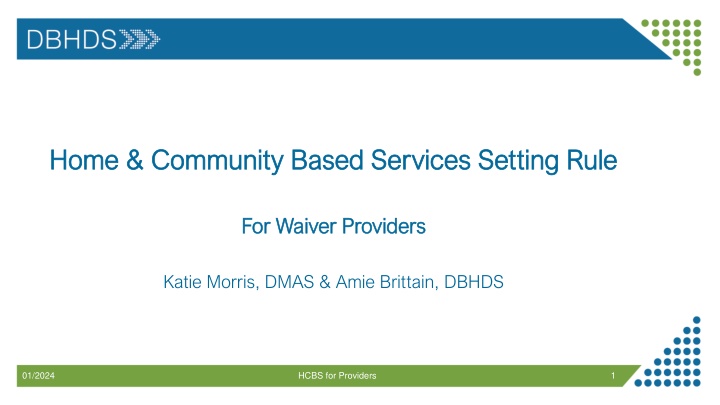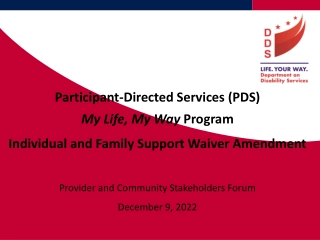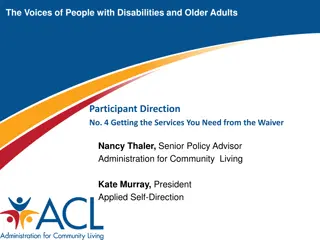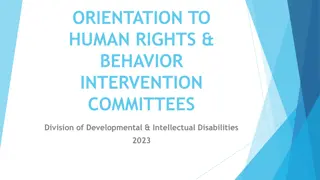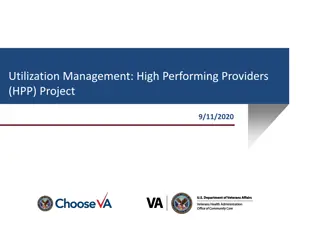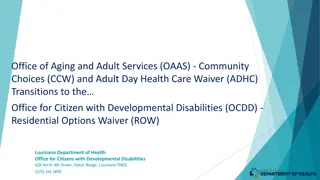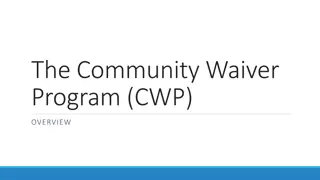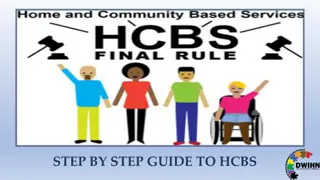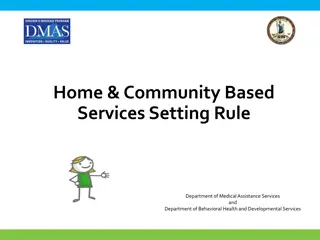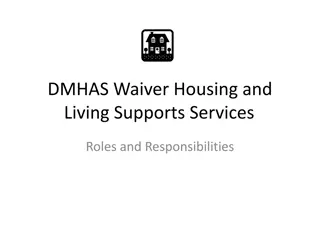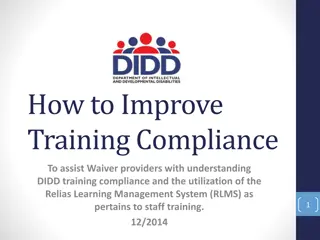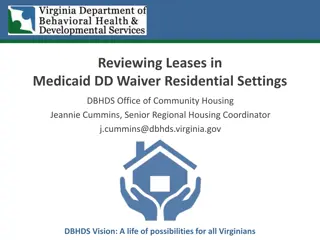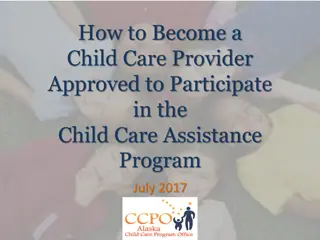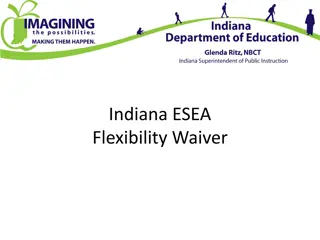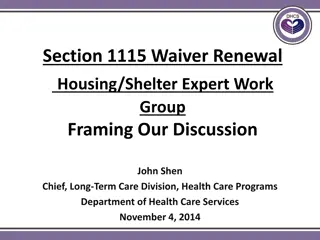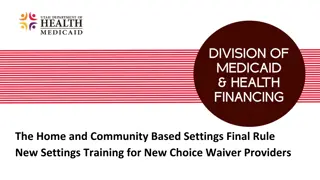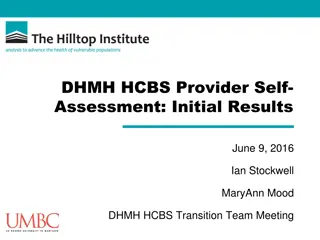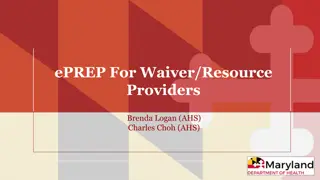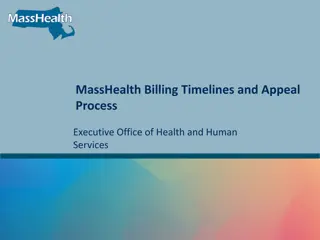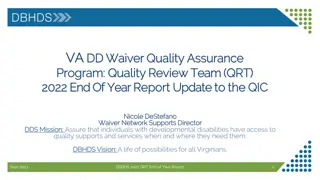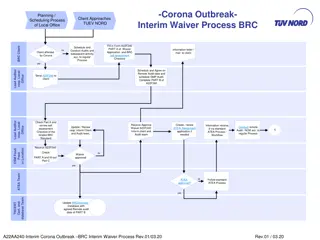Home and Community-Based Services Setting Rule for Waiver Providers
Explore the specific protections outlined in the HCBS Final Rule for waiver providers, emphasizing the goal of promoting individuals' rights, freedoms, and self-determination in Medicaid Home and Community-Based Services settings. Understand the requirements for full compliance and the importance of integrated settings that support community access and individual autonomy.
Download Presentation

Please find below an Image/Link to download the presentation.
The content on the website is provided AS IS for your information and personal use only. It may not be sold, licensed, or shared on other websites without obtaining consent from the author.If you encounter any issues during the download, it is possible that the publisher has removed the file from their server.
You are allowed to download the files provided on this website for personal or commercial use, subject to the condition that they are used lawfully. All files are the property of their respective owners.
The content on the website is provided AS IS for your information and personal use only. It may not be sold, licensed, or shared on other websites without obtaining consent from the author.
E N D
Presentation Transcript
Home & Community Based Services Setting Rule Home & Community Based Services Setting Rule For Waiver Providers For Waiver Providers Katie Morris, DMAS & Amie Brittain, DBHDS 01/2024 HCBS for Providers 1
Housekeeping Tips Microphones are muted because of the size of the training. Enter all questions into the chat. Any questions we are unable to answer will be posted in the Teams Chat after the training. This training is being recorded. 01/2024 HCBS for Providers 2
Purpose of Training Purpose of Training Purpose of Training The purpose of this training is to discuss the specific protections that are outlined in the HCBS Final Rule. Providers of Sponsored Residential, Group Home, Supported Employment, Day Programs, and Supported Living are required to FULLY comply with all HCBS requirements. HCBS for Providers 01/2024 3
HCBS Goal The Goal The Goal Individuals receiving Medicaid Home and Community-Based Services (HCBS) must have every opportunity to live with the same rights, freedoms, and degree of self-determination, and have the opportunity to integrate within their community, as anyone not receiving Medicaid Home and Community-Based services. Individuals receiving Waiver funding must have the same opportunity to live as freely and independently as you and me. HCBS for Providers 01/2024 4
HCBS Home and Community Based Services Home and Community Based Services The Home and Community-Based Services (HCBS) settings regulations (previously known as the Final Rule ) was published in the Federal Register on 1/16/14 and became effective on 3/17/14. Virginia must reach full compliance with the Final Rule in order to keep the federal reimbursement for HCBS services by 12/31/2025. HCBS for Providers 01/2024 5
HCBS Requirements Setting is integrated & Supports Full Access to the Community Rights of Privacy, Dignity & Freedom from Coercion & Restraint Values, Principles & Common Language HCBS HCBS Requirements Requirements Optimize, but does not regiment individual initiative & autonomy Additional Conditions for Residential Settings Facilitates choice regarding services & supports & who provides them Supportrs 01/2024 6
Presumed Competence The Foundation of HCBS: Presumed Competence The Foundation of HCBS: Presumed Competence Presumed competence is a strengths assumes people with disabilities assumes people with disabilities have the ability to understand understand. a strengths- -based have the ability to learn, think and based approach that approach that learn, think and This includes the ability to make choices (maybe even choices that their supports, natural and paid, disagree with), determine their own goals and be the person in charge of their life path. HCBS for Providers 01/2024 7
The Basics HCBS Requirements: The Basics HCBS Requirements: The Basics Be integrated and support access to the greater community; Provide opportunities to seek employment and work in competitive integrated settings; Facilitate individual choice regarding services & supports and who provides them; Ensure an individual s rights of privacy, dignity, respect, and freedom from coercion and restraint; Be selected by the individual from among setting options, including non-disability specific settings; Participate in the person-centered planning process. HCBS for Providers 01/2024 8
Additional Rights Additional Rights in HCBS Residential Locations: Additional Rights in HCBS Residential Locations: Individuals should have a lease or other legally enforceable agreement; Privacy in bedroom with lockable doors; Choice of roommates; Freedom to furnish and decorate the unit; Freedom and support to control schedules and activities; Access to food any time; Right to have visitors at any time; Have an accessible environment. HCBS for Providers 01/2024 9
Lease Lease / Residency Agreement Lease / Residency Agreement Individuals should have a lease or other legally enforceable agreement. Follow the VA Landlord Tenant Act. Address eviction procedures. Not be in conflict with HCBS agency policies. Virginia Department of Housing and Community Development HCBS for Providers 01/2024 10
Privacy and Locks Privacy and Locks Privacy and Locks Privacy in bedroom and bathroom and lockable doors. Bedroom doors should have locks with keys, but keypad locks are acceptable if an individual is able to use a keypad lock. Staff and other individuals knock before entering AND wait for permission to access. Doors can be closed when the individual is in their room. An individual can use the phone, computer, etc. in the privacy of their room with the door closed. Individuals should also have keys to their residency. HCBS for Providers 01/2024 11
Bedrooms Bedrooms Bedrooms If a room is shared, the individuals must choose with whom they share the room. Freedom to furnish and decorate the unit. Examples include: bedroom paint color, bedspreads, d cor, pictures, furniture, TVs, technology, etc. The individual should be asked for their preference in decorating the room. If the individual shows no specific interest in decorations, then the residential provider should strive to decorate the individual s room in a manner that fits the individual s personality/interests and not only the interests or preferences of the provider, family, etc. HCBS for Providers 01/2024 12
Schedules Schedules Schedules Individuals should be able to wake up and sleep when they want. Choose to stay home or go on outings or program/job. Have the option to use public transportation instead of the van. Participate in preferred activities in and out of the home. Freedom and support to control schedules and activities when to eat, bathe, etc. HCBS for Providers 01/2024 13
Access to Food Access to Food Access to Food Have access to food at any time. Eat what, when they want and where they want. Individuals should have some input in menu choices and have the ability to choose to eat something different than what is on the menu. Individuals should have the choice to eat earlier or later than established mealtimes, and have a snack when they want. HCBS for Providers 01/2024 14
Visitors Visitors Visitors Right to have visitors at any time. Ability to have overnight visitors. Visitors are not limited to family. Visitors can be friends, co-workers, and significant others. Visitors do not need to be pre-screened or have a background check. HCBS for Providers 01/2024 15
Accessibility Accessibility Accessibility Right to an accessible home. Ability to access all common areas (office, laundry room, basement, etc.), bedroom and bathroom. Accessible entrances and exits of the home. As a reminder, the right to an accessible environment CAN NOT be modified! HCBS for Providers 01/2024 16
Modifications Modifications Modifications As a provider, you were required to have included a specific modification section in your As a provider, you were required to have included a specific modification section in your HCBS policy. You are responsible for following your own policy. HCBS policy. You are responsible for following your own policy. Ongoing staff training on modifications and the HCBS policy will improve consistency in all settings owned or operated by the provider. The modification process does not negate any required Human Rights process. Please reach out to your local Human Rights advocate if you have questions regarding the Human Rights regulations. When all options for less restrictive interventions have been tried without success to support an individual s health and safety needs, a provider can implement a modification of a residential specific right. The process for implementing rights modifications is person-centered. It ensures that the individual fully understands and agrees to the modifications. If a modification is required, it is not expected to remain in place forever. HCBS for Providers 01/2024 17
Modifications Modifications Modifications To determine if a modification is necessary, ask the To determine if a modification is necessary, ask the following questions: 1.Are any of the residential specific protections causing a health and safety concern for the individual receiving services? 2.Have less intrusive interventions been used? This could include: specific staff supports, natural supports, specific services (AT, TC, etc.). 3.Will the proposed modification do no harm to the individual? 4.Does the individual/guardian/authorized representative consent to a modification? following questions: HCBS for Providers 01/2024 18
Modifications Modifications Modifications A provider is required to collect data on the intervention and review the modification on an ongoing basis. Data collection and review must measure the ongoing effectiveness of a modification. Modifications must be reviewed at time limits that are established by the provider (ex- monthly, quarterly, etc.). At this review, the ability to terminate the modification must be discussed. The modification must be documented in the Safety Restriction Form in WaMS. This is included in the provider ISP section. Safety Restriction Form located HCBS for Providers 01/2024 19
Marys Story Mary s Story Mary s Story Mary has a history of eating non-food items (PICA). When staff offered Mary a key, she attempted to eat it. Staff discussed the idea of a key- pad entrance, but Mary s motor skills are a barrier to this option. As such, Mary s right to access her bedroom key has been modified. The staff will keep Mary s key in a closet. She can inform staff when she would like to lock her door. Mary consented to this modification, it is documented in her ISP, and the provider follows the process to review the modification from time to time. HCBS for Providers 01/2024 20
Marys Story Mary s Story Mary s Story Mary s attempt to eat a key is a health and safety concern. Staff looked in to less restrictive options (key-pad) and documented it. Mary consented to this modification. Staff documented appropriately, has data collection elements included in her plan and will review the need for the modification quarterly when completing her person-centered reviews. HCBS for Providers 01/2024 21
Justins Story Justin s Story Justin s Story Justin spends a great deal of time on social media and dating apps. He has made connections with many people online and has been taken advantage of in financial schemes and catfishing. Justin has recently made several connections to people online and he invited these folks to his house (group home setting). Justin did not know these people and provided them with an invitation to come in the home as well as his address & phone number. Strangers have shown up at Justin s home. 01/2024 HCBS for Providers 22
Justins Story Justin s Story Justin s Story Staff discussed with Justin the safety risks of his choices and explained boundaries with strangers. Justin s mother also discussed safety awareness with him and encouraged him to meet people in public places. Justin did agree that meeting people in public places (coffee shops, parks, restaurants, etc.) would be a safer option rather than inviting people to his home. However, he said he feels pressure to make his online friends happy. Justin and his support team decided that Justin s right to have visitors at any time requires a modification until additional safety awareness skills are acquired. 01/2024 HCBS for Providers 23
Justins Story Justin s Story Justin s Story Justin s internet behavior causes a safety concern. Natural and paid supports have provided education and supports to Justin to address the unsafe behavior. Justin consents to the modification. Justin is not fully restricted from meeting his new internet friends, he will have the option to meet in safer, public settings. Staff will provide ongoing supports to Justin to learn how to have safe online behavior. This is included in Justin s plan and the modification will be reviewed quarterly. The Safety Restriction Form is completed. 01/2024 HCBS for Providers 24
Amelias Story Amelia s Story Amelia s Story Amelia is a woman who lives in a sponsored residential setting. She has a diagnosis of Prader-Willi Syndrome and has been recently diagnosed with diabetes and high blood pressure. Amelia frequently tells her sponsor provider that she feels tired and gets headaches often. Amelia s health is greatly impacted by her Prader-Willi Syndrome, but she reports being unable to stop eating because she is always hungry. Amelia and her support team decided to try keeping only diabetic-friendly snacks available, but Amelia continued to overeat and have negative side-effects (like headaches/ increased blood sugar). 01/2024 HCBS for Providers 25
Amelias Story Amelia s Story Amelia s Story Amelia s sponsor supported her to seek guidance from her doctor and a dietitian, but Amelia reported that she will not be able to follow their diet plans. As a last resort, Amelia and her team have decided to limit access to the pantry by using a lock and with this plan in place Amelia will be better able to control her diet. Amelia was involved in this decision and agreed to the modification. Amelia s provider also consulted with DBHDS Human Rights prior to installing the lock. 01/2024 HCBS for Providers 26
Amelias Story Amelia s Story Amelia s Story Amelia s access to food is causing a health risk. Amelia s provider tried less-restrictive options before implementing a modification. Amelia consented to the modification. The provider contacted DBHDS Human Rights. Provider documented appropriately. 01/2024 HCBS for Providers 27
NOT Modification What is NOT a Modification What is NOT a Modification Eric works at Target and his shift begins at 9am. In order to make it to work on time, Eric must wake up at 7:30am. Eric does set an alarm on his phone, but he often sleeps through it. Eric has asked his residential staff to support him by waking him up no later than 7:40am if he sleeps through his alarm. This is NOT a modification to Eric s ability to direct his own schedule. This is a requested support that is outlined in his part V and implemented by his support team. Jordan is prone to losing his front door key. As a result, Jordan s sponsored provider keeps the front door key in a lock box outside of the garage. Jordan knows the code for the lock box and is able to access the key whenever needed. This is NOT a modification to Jordan s ability to access the key to his home. He has access to the key and feels satisfied with the current set-up. 01/2024 HCBS for Providers 28
NOT Modification What is NOT a Modification What is NOT a Modification Tristan is an individual who resides in a sponsored setting. He has limited motor skills and requires full staff support with all ADL needs. His part V outlines his support needs and gives staff specific instruction for how to best provide him privacy. Tristan is left alone while using the toilet and knocks on the wall when he is ready for staff to support him. This system provides Tristan with privacy and dignity. This is NOT a modification to his right to privacy. It is simply the level of support needed to complete the ADL tasks. Rashan likes to live in a minimal environment. He does not like bright colors, items on his walls or any tabletop decorations. Rashan s only d cor request is black-out curtains in his room. Rashan s support team did notice that he seems to like the color blue and selected a blue comforter and pillowcases. Rashan s room is minimal, but this is NOT a modification. This is his preference and does not require a modification. 01/2024 HCBS for Providers 29
Modification Summary Modification Summary Modification Summary A modification should not be used because the provider believes that the individual is incapable of exercising his/her/their HCBS rights. HCBS rights are inherent Human Rights. are inherent Human Rights. A modification is not to be used to restrict people from doing things the provider is uncomfortable with. A modification is only to be used for health and safety reasons. A modification must follow the process outlined in the settings regulation (modifications are justified and documented, with alternatives, consent given, and revisited regularly by the provider.) As providers, we are there to support support individuals and help them to build skills skills. HCBS rights build 01/2024 HCBS for Providers 30
Common Areas Needing Improvement Common Remediation Areas for Providers Common Remediation Areas for Providers - HCBS rights not being understood or distinguished from Human Rights - Individual inability to access or spend own money - Providers not understanding TRUE Community engagement - Documentation not showing community involvement, choice, autonomy and independence - Activities not individualized, supports happening in large groups no individual outings - Documents not using person-centered language don t use client, resident, participant, consumer - Individuals not having keys to bedroom doors and front door of home -Excessive signage in the person s home - No evidence of transportation options - Modifications to HCBS rights not being documented in Part V - Accessibility individuals need access to all common areas of the home (basement, lofts, office, laundry room) - Provider lease agreements/residential agreements not addressing reason for eviction and giving proper notice HCBS for Providers 01/2024 31
CMS Findings CMS Findings During Site Visits CMS Findings During Site Visits - All outings planned as a group activities not individualized. - Medication schedules/Individual information posted in home excessive signage and does not consider dignity of individuals in the home. - Individuals get a weekly allowance and have little control over finances. - Staff unaware of HCBS regulations - Token system where individuals get to do things for good behavior. - Staff wear uniforms institutional/lacks dignity - Lease in place but vague on eviction protections and appeal rights for the individuals. - Setting has visiting hours - Staff walking in individuals rooms without asking permission or knocking. - Individuals did not have control over their schedules or activities - Indoor cameras without consent and policy reviewed by Human Rights. - Plans indicate many modifications and restrictions without any supporting documentation. HCBS for Providers 01/2024 32
Full Compliance Full Compliance Full Compliance Once a setting has achieved full compliance, a letter will be sent to the provider. Reaching Reaching HCBS compliance is not a one HCBS compliance is not a one- -time achievement compliance status which will be monitored on an ongoing basis through: The DBHDS Office of Licensing The Office of Human Rights DMAS QMR Support Coordination and other quality monitoring reviews. If If a setting can t reach full compliance, the provider a setting can t reach full compliance, the provider participation agreement will be reviewed Possible consequences include: suspension of billing, and removal of the agreement. time achievement. A provider must maintain their participation agreement will be reviewed. HCBS for Providers 01/2024 33
Resources HCBS Resources HCBS Resources Statewide Waiver Transition Plan for Statewide Waiver Transition Plan for review: http://www.dmas.virginia.gov/Content_pgs/HCBS.aspx review: HCBS Toolkit HCBS Toolkit The Toolkit can be located on the DMAS Website: https://www.dmas.virginia.gov/for-providers/long-term-care/waivers/home-and-community- based-services-toolkit/ You may also reach out directly to DMAS hcbscomments@dmas.virginia.gov HCBS for Providers 01/2024 34
Resources HCBS Resources HCBS Resources DMAS DMAS Katie Morris, Quality and Service Integrity Manager Katie.morris@dmas.virginia.gov DBHDS DBHDS Amie Brittain, Policy and Compliance Manager Amie.brittain@dbhds.virginia.gov CRC CRC All Regions All Regions Ronnitta Clements Ronnitta.clements@dbhds.virginia.gov HCBS for Providers 01/2024 35
